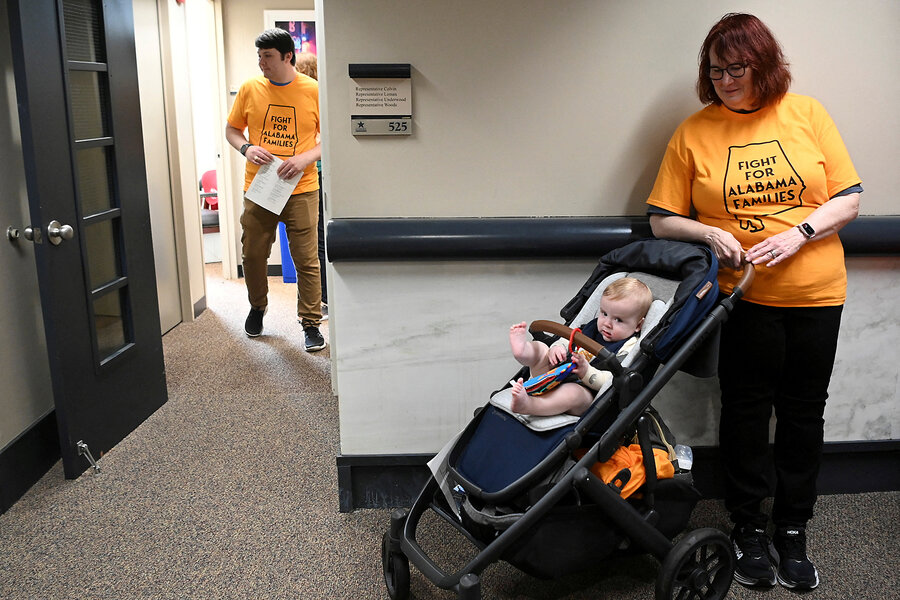Alabama’s IVF ruling is having ripple effects. What it does – and doesn’t – do.
Loading...
A national conversation about the full spectrum of issues around defining when “life” begins is underway at kitchen tables and workplaces alike, forged by weeks of legislative and judicial upheaval in Alabama and beyond.
It began when Alabama’s state Supreme Court last month declared human embryos located outside a woman’s body to be children – a reference to those created through in vitro fertilization, or IVF. Some clinics halted IVF treatments completely, fearing prosecution. State legislators responded with a quickly passed law to safeguard IVF providers. Alabama Gov. Kay Ivey signed it right away.
Why We Wrote This
An Alabama court ruling on in vitro fertilization has added to nationwide upheaval over questions of reproductive rights and when life begins. We look at three questions about the aftermath of the Alabama decision.
The drumbeat has continued: Kamala Harris visited an abortion clinic last week – the first vice president to do so; religious conservatives are asking House Republicans to clarify their views on when life begins; and Democrats in Alabama are pushing state legislation to protect contraception.
The case has also made it into the presidential race, with President Joe Biden linking the Alabama decision to the U.S. Supreme Court’s ruling two summers ago giving states jurisdiction over abortion access. And former President Donald Trump said on the campaign trail that he supports IVF, while his record on broader reproductive rights reflects the goals of anti-abortion conservatives.
A national conversation about the full spectrum of issues around defining when “life” begins is underway at kitchen tables and workplaces alike, forged by weeks of legislative and judicial upheaval in Alabama and beyond.
It began last month when Alabama’s state Supreme Court declared human embryos located outside a woman’s body to be children – a reference to those created through in vitro fertilization, or IVF. Some clinics halted IVF treatments completely, fearing prosecution. Health care providers and fertility patients voiced frustration and panic.
State legislators responded three weeks later with a quickly passed law to safeguard IVF providers. Alabama Gov. Kay Ivey signed it right away, “so that couples in Alabama hoping and praying to be parents can grow their families through IVF.”
Why We Wrote This
An Alabama court ruling on in vitro fertilization has added to nationwide upheaval over questions of reproductive rights and when life begins. We look at three questions about the aftermath of the Alabama decision.
The national attention hasn’t faded: Kamala Harris visited an abortion clinic last week – the first vice president to do so; religious conservatives are asking House Republicans to clarify their views on when life begins; and Democrats in Alabama are pushing state legislation to protect contraception.
Despite efforts to calm heightened, and often partisan, rhetoric, confusion over the future of IVF lingers. The new Alabama law gives legal immunity to IVF providers for the destruction of embryos without addressing the core issue of what is referred to as “fetal personhood.” Experts question whether the new law will hold up under the court ruling. They also point to broader social and ethical implications.
“There are as many understandings of the status of when life begins, or what is a human life, as there are people,” says Joanne Rosen, an expert on law and reproductive policy at the Johns Hopkins Bloomberg School of Public Health. “The Alabama case decides as if this were definitive and as if there were only a singular view.”
What was important about the state Supreme Court ruling?
The Alabama Supreme Court ruling took the personhood concept to a new level. For the first time, a state court assigned rights to an embryo outside the womb. Other states recognize unborn children as people, but those have been limited to fetuses in utero, or inside a woman’s body.
“We are in uncharted territory here, in Alabama and nationwide as we look at the implications of this ruling,” says Naomi Cahn, co-director of the Family Law Center at the University of Virginia School of Law.
Anti-abortion activists have long sought fetal personhood laws, and have succeeded in a number of states since the U.S. Supreme Court overturned Roe v. Wade in 2022. The Alabama court case shows the practical effects of extending “personhood” beyond in utero embryos. At the same time, the new law has not resolved uncertainty in the fertility industry – and it has ratcheted up debate.
Anti-abortion groups are split on IVF. Some believe embryos – even if frozen, in a test tube, and nonviable unless implanted – should be protected as human. Others see IVF as aiding the creation of life, and accept the loss of embryos as part of the process.
A coalition of anti-abortion groups, including CatholicVote and the Southern Baptist Convention, responded to the Alabama immunity bill with a letter of protest. Laws should consider the millions of embryos that could be “discarded or frozen indefinitely, violating the inherent dignity they possess by virtue of being human,” writes the coalition.
Medical science sees it differently: Pregnancy is defined as taking place when an embryo, or fertilized egg, implants in the uterus. Protecting nonviable in vitro embryos raises questions about contraception that prevents implantation – like some IUDs, the devices placed inside a uterus to prevent pregnancy. Personhood arises in tax law, too: Georgia, for instance, allows tax breaks for an “unborn child with a detectable heartbeat.”
A February poll shows 66% of Americans oppose “considering frozen embryos as people and holding those who destroy them legally responsible.”
What does – and doesn’t – the new law do?
On March 6, Alabama lawmakers enacted a narrowly focused bill that shields IVF service providers from prosecution related to the damage or destruction of an embryo at any point in the IVF process. It also offers limited protection to IVF-related manufacturers.
The Alabama court case came about because frozen embryos belonging to couples undergoing IVF treatment at an Alabama clinic were destroyed. Those couples sued the clinic for negligence and damages under the state’s Wrongful Death of a Minor Act.
The state Supreme Court, in its February decision, considered whether the frozen embryos qualified as minor children. The court said they do. Referencing the state constitution, which affirms the rights of unborn children, the court wrote that unborn children are children “without exception based on developmental stage, physical location, or any other ancillary characteristics.”
Immediately following that ruling, at least three of Alabama’s eight IVF clinics and a local company that ships embryos shut down, leaving clients in limbo.
The new state law offered enough assurance to IVF providers that two of the Alabama clinics that had halted treatments resumed business within a day of the law’s enactment. But the Center for Reproductive Medicine in Mobile remains closed, stating that the law “falls short” and “leaves challenges for physicians and fertility clinics trying to help deserving families have children of their own.”
IVF is physically painful, emotionally draining, and expensive. Common practice is to create multiple embryos at a time, to keep procedures to a minimum. The extras are frozen, for future siblings or to use if an implantation fails. About 2% of babies born in the United States are a result of IVF.
How is this impacting the rest of the country?
Other states are watching. A day after Governor Ivey signed the Alabama law, Iowa’s House passed a fetal homicide bill that defines an unborn person as existing “from fertilization to live birth.” Florida has now postponed a fetal personhood bill amid concerns about impacting IVF treatments.
State laws surrounding reproductive rights reflect the complexity and diversity of anti-abortion views on when life begins. Not all states with personhood laws have complete bans on abortion; states that qualify life as being viable, implanted, or “in the womb” may grant rights to unborn children or their parents. But they also allow for some early-term abortions. Frozen embryos fall outside that definition of life.
Some states also have specific IVF provisions in their personhood laws. Arizona, for one, acknowledges life “at every stage of development” but also states its law is not to be used against IVF providers.
The ruling has fueled momentum for anti-abortion groups; the Alliance Defending Freedom called it a “tremendous victory for life.” Reproductive rights advocates are raising alarms; the Guttmacher Institute wrote that Alabama’s ruling “could have devastating repercussions for families seeking IVF treatment & far beyond.”
The case has made it into the presidential race, with President Joe Biden linking the Alabama decision to the U.S. Supreme Court’s ruling two summers ago giving states jurisdiction over abortion access. And former President Donald Trump said on the campaign trail that he supports IVF, while his broader record reflects the goals of anti-abortion conservatives.
The extremity of the court’s decision is an inflection point, says Professor Rosen. “And regardless of the direction,” she adds, “it has truly introduced a tremendous amount of uncertainty and anxiety and chaos.”
That uncertainty means anything is possible, especially in an election year when reproductive rights are front and center. “While I can’t predict the next step,” says Susan Pace Hamill, a professor at the University of Alabama School of Law, “this is not over.”










